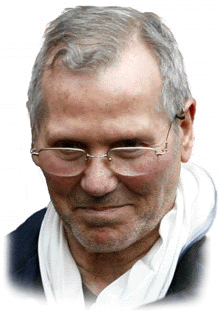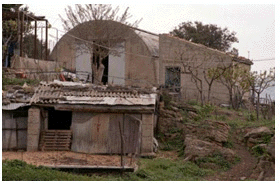...Best of Sicily presents... Best of Sicily Magazine. ... Dedicated to Sicilian art, culture, history, people, places and all things Sicilian. |
by Roberto Paglia | ||
Magazine Index Best of Sicily Arts & Culture Fashion Food & Wine History & Society About Us Travel Faqs Contact Map of Sicily |
The eccentric and elusive Provenzano was found in a rural shack (shown here) furnished simply, with access to satellite television, though Provenzano shunned the use of cellular telephones and other communication methods which might have permitted the police to trace him. Still, widespread speculation suggests that the authorities knew his whereabouts for many years, and that people in Corleone saw him around town on occasion. Provenzano's invisibility earned him the nickname "The Ghost of Corleone," and he was known as "The Tractor" for his ruthless methods, but just how powerful was this 73 year-old man? Apart from murder, long the Mafia's trademark, Bernardo Provenzano seems to have been involved with up to fifteen percent of the publicly-bid building and civil construction projects in western Sicily. Most of the island's clans (based more on geography than on family ties) answered to him only indirectly, and some of the notes confiscated in his lair mention the names of people not yet investigated by police, as well as politicians. None of this is particularly surprising, however. During Provenzano's reign the Mafia has more efficiently infiltrated
politics and public building (and restoration) while decreasing its involvement
in narcotics The organisation never sleeps. Entrepreneur Libero Grassi and judge Giovanni Falcone were killed by Provenzano's comrades-in-crime, and Bernardo himself has been tried and convicted (in absentia) for two murders. Organised crime (the Mafia) and political corruption (its close cousin) are the most serious social problems confronting Sicily today, largely responsible for the island's poor economy (and the virtual lack of industry) and the resulting unemployment. If the Mafia's influence on the Sicilian economy is difficult to overlook, its effects are impossible to escape. The Mafia is nothing if not versatile. It inevitably survives, and it is very probable that a new leader has already been appointed by the Cupola (Sicily's Mafia commission). A new generation of technically sophisticated heirs will take the place of Provenzano and Riina, who themselves were never more than mediocrities even by Mafia standards; they simply happened to step into a power vacuum. DNA will identify them as it did Provenzano. There will, of course, be another Bernardo Provenzano, and we'll soon learn his name, perhaps following a bloody Mafia war. The organisation lives. About the Author: Roberto Paglia has written several articles for this publication relating to social topics. | |
Top of Page |
 Tuesday, 11 April 2006 will
become infamous for two things. It was the day that Italy's right-centre
government, with Silvio Berlusconi at the helm (serving longer than any
other prime minister in post-war history), was marginally defeated by a
shaky leftist coalition, and it was the day that Bernardo Provenzano, supreme
head of Sicily's
Tuesday, 11 April 2006 will
become infamous for two things. It was the day that Italy's right-centre
government, with Silvio Berlusconi at the helm (serving longer than any
other prime minister in post-war history), was marginally defeated by a
shaky leftist coalition, and it was the day that Bernardo Provenzano, supreme
head of Sicily's  trafficking and extortion,
though these activities remain an important source of its revenue. (As we
recently reported in "
trafficking and extortion,
though these activities remain an important source of its revenue. (As we
recently reported in "